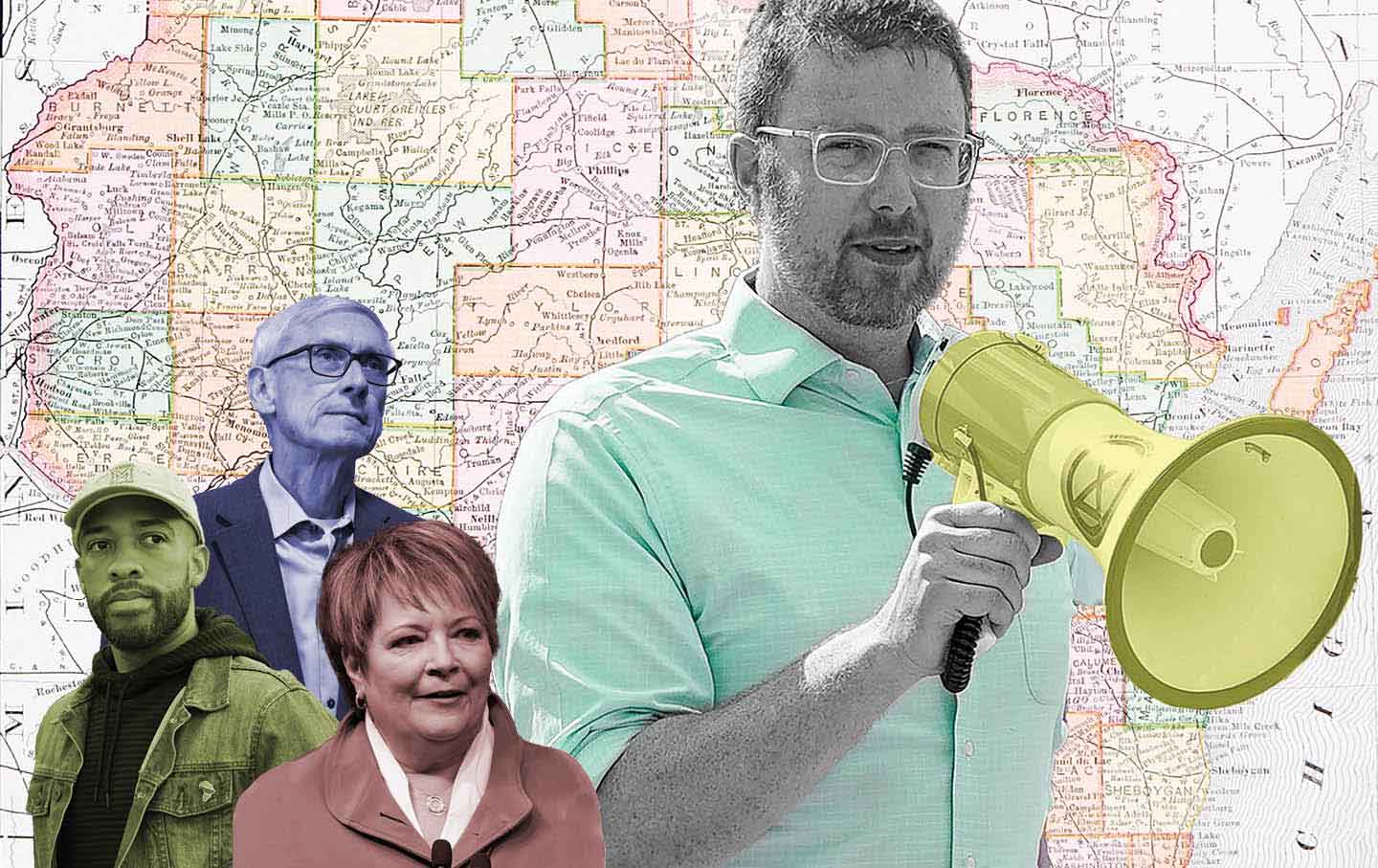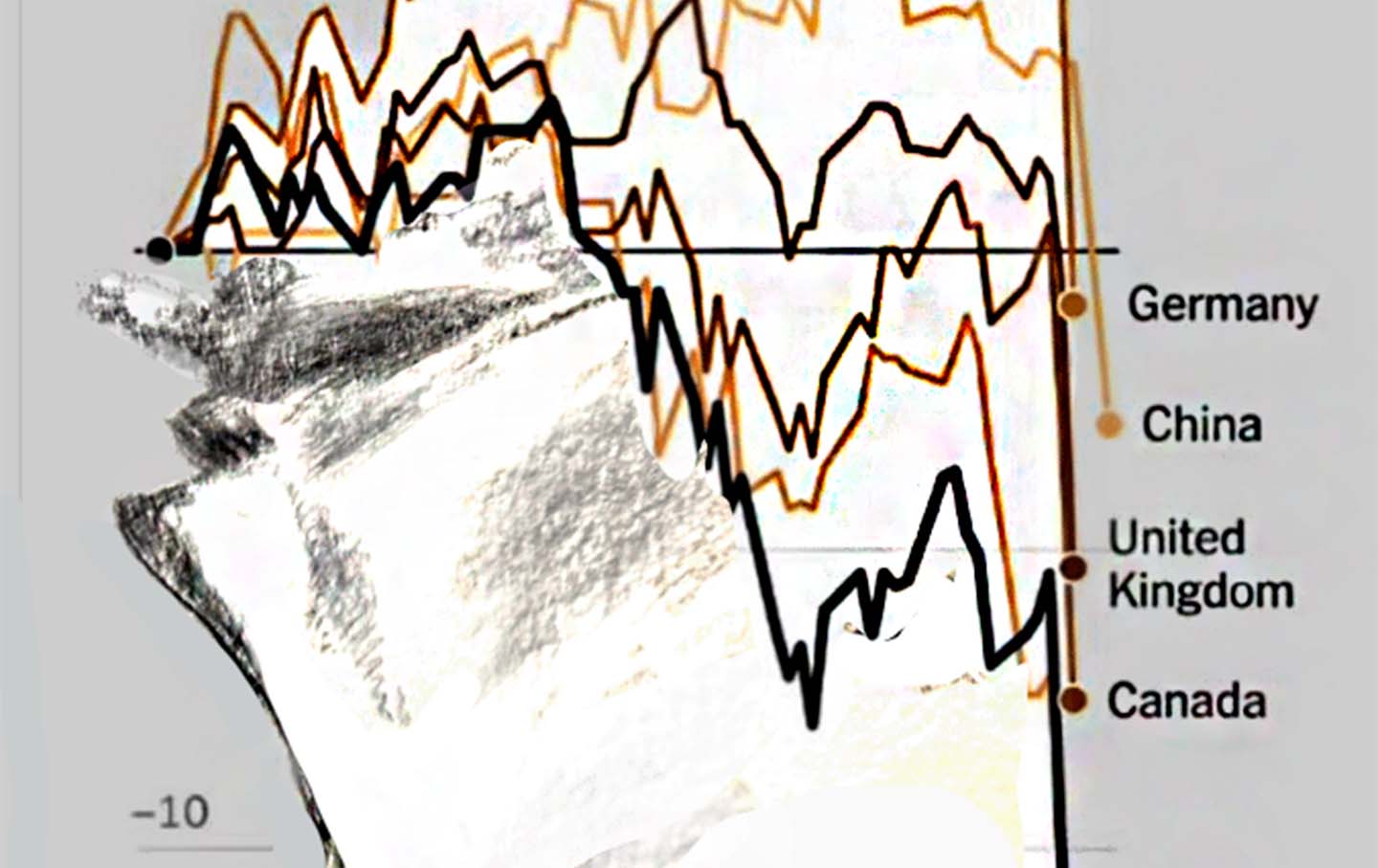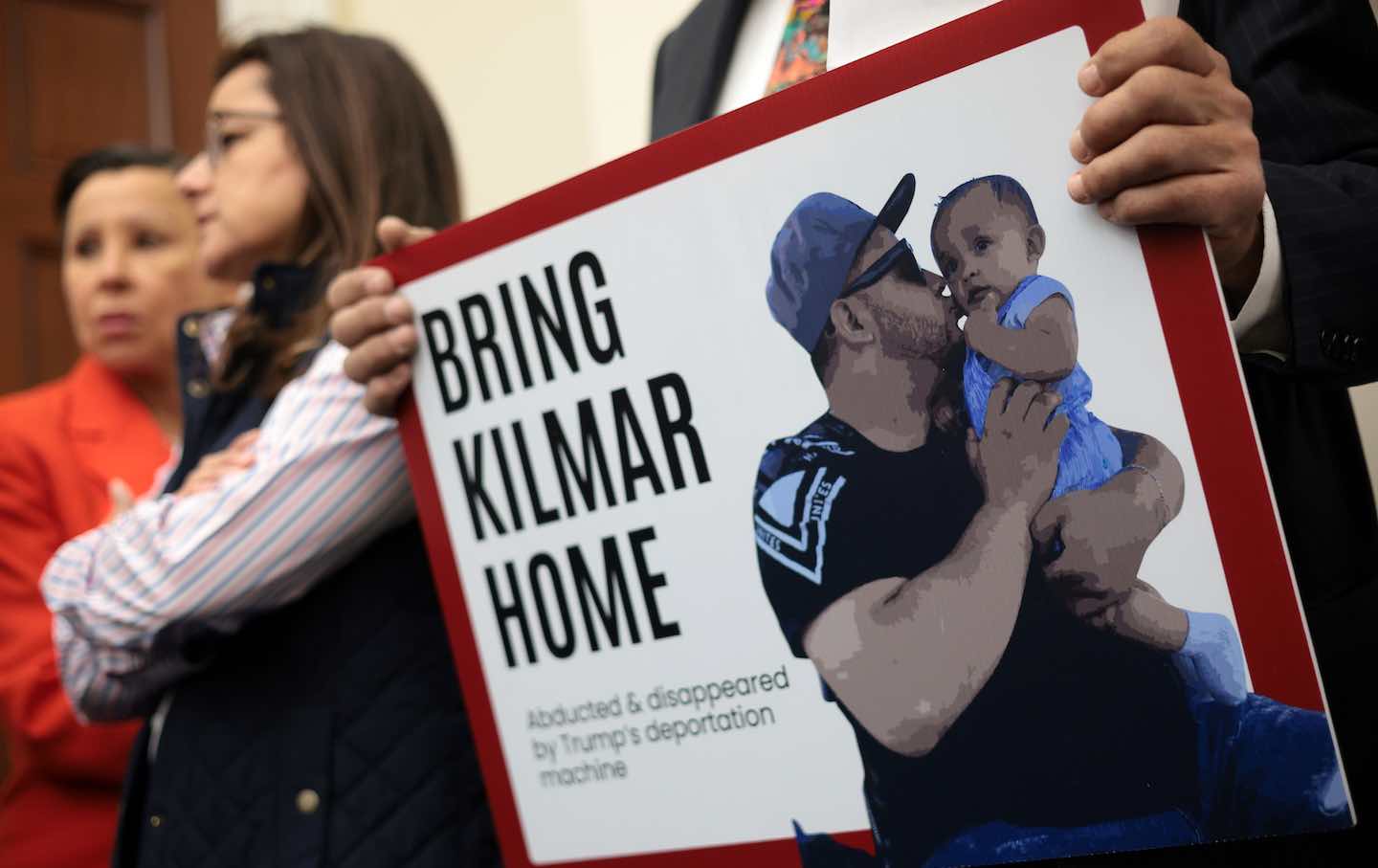
Since Ben Wikler took charge of the Democratic Party of Wisconsin, the organization has upped the ante for state elections.
(left to right: Scott Olson / Getty Images; Scott Olson / Getty Images; Morry Gash / AP; Andy Manis / Getty Images)
Wisconsin Democratic Party chair Ben Wikler, the former Washington director for the activist group MoveOn who successfully battled key elements of Donald Trump’s first-term agenda before returning to his native state and renewing the Democratic Party’s fortunes there, announced Sunday that he is joining a rapidly expanding field of candidates for chair of the Democratic National Committee.
His rivals include Minnesota Democratic-Farmer-Labor Party chair Ken Martin, the presumed frontrunner in the contest; former Maryland Governor and 2008 presidential candidate Martin O’Malley, and New York state Sen. James Skoufis. Ousted Ohio US Senator Sherrod Brown, former Chicago Mayor and current Ambassador to Japan Rahm Emanuel, Michigan state Sen. Mallory McMorrow, and Democratic strategist Chuck Rocha are all said to be mulling bids.
Wikler, who helped organize the fight to save the Affordable Care Act in 2017 and then earned a national reputation as a master of battleground state politics in Wisconsin, launched his candidacy with an announcement that he wants to be at the forefront of the Democratic electoral pushback against Trump, who will return to the White House on January 20, 2025, with a Republican Congress by his side.
“If we’re going to take on Trump, Republican extremists, and move our country forward, the Democratic Party needs to be stronger. I’m running for Chair of the Democratic National Committee to unite the party, fight everywhere, and win,” Wikler said. He proposed to renew the party’s fortunes by taking his Wisconsin strategy—with its emphasis on organizing, activism, and outreach to working-class voters—national.
This year, that strategy saw the Democratic presidential ticket run better in Wisconsin than in any other presidential battleground state, secure a new term for Senator Tammy Baldwin, and dramatically expand party representation in the state legislature. “What has made a difference in Wisconsin can make a difference everywhere,” said Wikler. “We need a nationwide permanent campaign, with a battle plan and resources for every state and territory in the country. We have to think and build long-term—while showing, through our actions, who we are.”
That message drew quick endorsements from Wikler’s Democratic allies in Wisconsin, such as recently reelected Senator Tammy Baldwin and former Congressional Progressive Caucus chair Mark Pocan as well as raves from progressive stalwarts such as former Labor Secretary Robert Reich, who highlighted Wikler’s track record in Wisconsin. “Wikler,” said Reich, “is a progressive who knows how to win elections with a Democratic Party that’s on the side of the little guy.”
The Nation has been following Wikler for years. Below, you can read the profile I wrote of him in 2023.
On the morning of the highest-profile state election of 2023, the highest-profile state party chair in the country could have been making the rounds of the cable TV shows that regularly invite him to comment on national politics. He could have been checking in with the Biden White House, where aides closely monitor his work. He could have been cajoling a major donor to steer another check into what has been hailed as one of the most innovative and successful political fundraising operations in American history.
But Ben Wikler was far from the cameras, the consultants, the contributors, and the candidates. The indefatigable chair of the Democratic Party of Wisconsin was up before dawn and headed to Monticello, a village of about 1,446 nestled in the farm country of rural Green County. “First door of the day!” Wikler announced, smiling as he held aloft a packet of brochures for Judge Janet Protasiewicz, who was campaigning to give the state Supreme Court a progressive majority that could transform Wisconsin politics. “We win when we organize everywhere.”
Wikler posted the selfie and his latest call to action on Twitter, and within hours the message had been viewed more than 150,000 times. But Wikler wasn’t tracking the response on his phone. He was working those doors, urging everyone he met to get to the polls and to take their friends. Before that cold, rainy Election Day was done, and before Protasiewicz had declared a victory that sent shock waves around the state and nation, Wikler would race off to other communities across Wisconsin and personally knock on hundreds of doors.
While the high-flying consultants who imagine that elections are all about money and TV ads might question whether this was the most efficient use of a party chair’s time on a voting day, Wikler was certain that he was exactly where a cutting-edge practitioner of contemporary politics can and should be. “I wanted to send a message to everyone who was knocking on doors in that moment. There were thousands of people knocking in the rain, knocking in the snow, trying to figure out how to make it across an ice-covered walkway to get to someone’s front door,” he told me. “I wanted them to know that their work is honored and that their work makes a difference, and that everyone needs to do this work to build the state that we want, including the chair…. Knocking doors is the most important, the most exalted piece of this work.”
Wikler uses words like “exalted” and “mission” all the time. He talks about “finding the path to the mountaintop.” Part of a new generation of party leaders—many of them inspired by Bernie Sanders’s 2016 and 2020 presidential campaigns—Wikler doesn’t hesitate to portray politics as a righteous quest that is all about higher ideals. But don’t mistake this party chair for a quixotic campaigner who is satisfied with “moral victories.” He knows that Wisconsin’s Democratic partisans are looking for real wins to undo the damage done during almost a decade of overwhelming Republican dominance in the 2010s. During that period of GOP ascendancy in the state, right-wing Governor Scott Walker and Republican legislators shredded labor rights and attacked voting rights; Senator Ron Johnson twice beat progressive icon Russ Feingold; and Donald Trump became the first GOP presidential candidate to win the state since Ronald Reagan in 1984. But since Wikler took charge, a lot has changed for the Wisconsin Democratic Party, which carried the state for Joe Biden in 2020; reelected liberal Governor Tony Evers in 2022; extended a winning streak of mayoral races from small towns to the state’s largest cities; won most other state races (with the painful exception of Johnson’s roughly 26,000-vote victory over Democratic Senate hopeful Mandela Barnes); and seated two justices as part of a march to take charge of the state’s highest court. If anyone doubts Wikler’s commitment, they need only watch the video of his wife, Beth, wielding an electric razor as he gleefully kept his promise to shave his head if Wisconsin voters rejected Trump.
Four years into a state party chairmanship that began as a leap of faith for the former student activist, who’d made a name for himself as a global campaigner on AIDS issues, a pioneering podcaster, and a top strategist for the advocacy group MoveOn before returning to his home state in 2019, Wikler has upended the image of how a political leader operates. He’s broken the boom-and-bust pattern of election-year energy and off-year decline by hiring a permanent staff and raising more than $100 million to fund not just campaigns but steady outreach to the grassroots activists who have formed a volunteer army. Wikler’s taken the Democratic organization out of the back rooms and into the streets, raising the profile of the party and its chair to such an extent that the tech-industry bible Fast Company describes Wikler’s Wisconsin operation as “the only state party with its own national identity.”
That identity is the polar opposite of the plodding approach of the old-school insiders who still wield influence with much of the Democratic National Committee and many state parties—political players who often seem to be afraid of their own shadows. “I think what he’s accomplished is to make Democrats see their party as a winning party,” says state Representative Francesca Hong, a Madison Democrat. “The Democrats can finally stop fighting for scraps and think big.” To US Representative Jamie Raskin, a Maryland Democrat who made a campaign swing through Wisconsin last year with Wikler, “he exemplifies the healthy change we’re seeing in state party chairs. In the old days, the party chair was an insider, a fixer. Ben starts in a different place. He’s got the political prowess, but he’s also got this vision, these values, that he makes central to everything he’s doing,” Raskin explains. “It’s the party chair as organizer.”
The Democratic Party of Wisconsin’s messaging is aggressively progressive. It calls out racism and xenophobia, defends abortion rights without apology, embraces organized labor and environmental activism, and rips into the right’s agenda of banning books and criminalizing gender-affirming medical care. Just as important, the party is constantly upping the ante and pushing the limits by nationalizing local contests and portraying every election as a bigger-than-life struggle that must be won—as with Wikler’s statement regarding 2020: “Whoever wins Wisconsin wins the White House.” That approach is a reflection of Wikler himself, who admits, “I have found that when I don’t work on the thing that feels like the biggest fight, I have an existential crisis.”
The work “continues in so-called off-years and on-years, [because] the most extreme faction of the MAGA right has been on a revanchist quest ever since the inauguration of Joe Biden to take back what they have convinced people has been stolen from them,” the 42-year-old party chair explains. “If you think that the American experiment with democracy should continue, you have to think long-term. Most critically, you have to organize everywhere—across geography, in the most sparsely populated areas and the most densely populated, and across race and ethnicity. That work is happening right now, and it’s not going to stop after 2024. The North Star, for us, is to become a state not just where Democrats have won elections and passed progressive policies; the North Star is for Wisconsin to vault back to the forefront in the whole country for making clean, effective, honest government for the people. That’s the big vision.”
This reference to the “big vision” speaks to a longing on the part of Wisconsin Democrats for a return to the days when the state—known for progressive icons like Robert M. La Follette, Gaylord Nelson, and Feingold, for Socialist mayors and rural populists and pioneering civil rights campaigners—was a political battleground that bent toward the left. Wikler, who was born in Madison and raised in a family with its own progressive heroes (including a great-aunt who was a garment workers’ union activist and a grandmother who snuck out of the house to witness Franklin Roosevelt’s renomination at the 1944 Democratic convention in Chicago), embraces this nostalgia without apology. It’s a measure, says former Minnesota senator Al Franken, of “just how Wisconsin he is.”
One of Wikler’s first memories is of attending a 1988 Jesse Jackson rally when he was 7. At age 11, he worked on the insurgent 1992 congressional bid of the Native American activist Ada Deer—a “Run Like a Deer” campaign poster hangs on the wall in his kitchen. A passionate organizer even before he had a driver’s license, Wikler was a teenage aide for labor leader Ed Garvey’s campaign for governor in 1998. Later, he interned in Feingold’s Senate office. Wikler and his pal Josh Orton (who’s now an aide to Vice President Kamala Harris) organized Madison high school students to oppose a school district contract with Coca-Cola and corporate encroachments on public education. They then launched a campaign to increase state education funding, which secured a $20 million increase in special-education spending.
At Harvard, Wikler put aside political science to study economics. “If I wanted to be able to speak the language that was being used to weigh the big decisions, I should really focus on economics,” he recalls thinking. With fellow students, he worked to organize the Student Global AIDS Campaign. The group’s early-2000s campaigning to get companies to lower the price of AIDS drugs eventually extended to 85 chapters across the country’s campuses and took Wikler to South Africa and Senegal. With an unlikely coalition of ACT UP activists and evangelical Christians, they pressured the George W. Bush White House to increase funding to fight the global AIDS crisis from about $100 million to around $2.5 billion. “Being part of that was another moment of feeling like it’s worth dedicating your life to work in movements and politics in order to help humanity thrive,” Wikler says. “There actually is a path to progress.”
Popular
“swipe left below to view more authors”Swipe →At one point, it looked like Wikler might be headed for the international stage—for four years, he was the campaign director for the global online activist group Avaaz—and he was also drawn to the media through a partnership with Franken. As a fellow at Harvard’s Kennedy School in 2003, the comedian put out a call for students to join a study group and got an immediate response from Wikler, who in addition to his political activism had written for The Onion, a publication the Saturday Night Live veteran relished. “He said he was an Onion contributor and a [Paul] Krugman fan. That pretty much settled it,” Franken recalls. “Ben has tremendous discipline. He has enormous commitment. He has a grasp of the big picture, the long run. And, of course, he’s incredibly smart.” The two helped launch Franken’s Air America radio show and worked together to publish a takedown of Bush-era conservatives, Lies and the Lying Liars Who Tell Them: A Fair and Balanced Look at the Right, which became a No. 1 bestseller. After a stint as press secretary for the Ohio progressive populist Sherrod Brown’s 2006 Senate campaign, Wikler teamed up with his friend Aaron Swartz, the Internet activist who helped develop RSS and Reddit, to launch a fiercely political podcast called The Flaming Sword of Justice. The two would stay up until 3 am talking tech and politics, Wikler recalls. “One thing that was so electrifying about Aaron was that he looked at the world and didn’t start with the assumption that anything was fixed in place,” he says of Swartz, who died by suicide in 2013 after being hounded by federal authorities on charges that he’d engaged in the hacking of MIT computer networks as part of a fight to make the articles of academic journals free and open to the public.
Federal prosecutors charged Swartz with multiple counts of wire and computer fraud, including violations of the Computer Fraud and Abuse Act, and threatened him with up to $1 million in fines and 35 years in prison—an approach that John Dean, the former White House counsel who was implicated in Watergate, called “Nixonian.” Two months before his trial was to begin, Swartz was found dead in his Brooklyn apartment. A week later, Wikler addressed hundreds of people at Swartz’s memorial service at New York’s Cooper Union, delivering a poignant reflection on their friendship. Since then, Wikler has frequently paid tribute to Swartz, referring to him as “a troublemaker in all the best ways.” Of Swartz’s influence on him, Wikler says, “Aaron’s belief was that you could think through whether a social system, a law, a technological structure served humanity or not, and come up with something better and try to create it. His refusal to accept that the world would always be broken was more total than anything I’d ever encountered before.”
Wikler’s focus through much of the 2010s was on Washington, where he ran MoveOn’s D.C. office and organized the ultimately successful protests against fellow Wisconsinite Paul Ryan’s 2017 attempt to overturn the Affordable Care Act. Wikler could easily have built a career as a national organizer or in the media, but Wisconsin kept calling. For years, he’d fly home on weekends and for “vacations,” knocking doors for Wisconsin Democrats. By 2018, he and Beth, a respected health care policy analyst, decided to move their growing family back to Madison, where Ben would do something political. Even then, Wikler was being talked about as a prospective candidate—and that speculation continues. Franken, who parlayed an entertainment career into two terms as a US senator from Minnesota, says his friend would be a “great” contender and a great senator or governor. “First of all, he’s incredibly smart,” Franken says. “He’s very analytical about politics, and yet he also sees the fun side.” Wikler, for his part, shies away from discussions about a possible bid for Johnson’s Senate seat in 2028 or any number of other potential contests. The only race he’s running now, he says, is a June bid for another term in the elected state party chair position that he stumbled into following his return to Wisconsin.
After a reasonably successful 2018 election season that saw Evers upset Walker in the gubernatorial race, the party chair post opened up and Wikler announced for it. He ran on a slate with a pair of veteran party activists, Milwaukee County Supervisor Felesia Martin and Outagamie County party chair Lee Snodgrass, and promised to bring “FIRE” (Fight, Include, Respect, and Empower) to the party. The first meetings between the boyish activist from D.C. and seasoned partisans in places like Kenosha drew skeptical looks and, Wikler says, “stink eyes.” Undaunted, he called every delegate who had attended recent state party conventions—more than 3,000 people—and traveled through ice storms to sit around kitchen tables with rural county party chairs. “I heard about so many frustrations, so many things that had gone wrong,” Wikler says. “But there was still the thread of idealism that kept them working in counties that had gone 70–30 for Trump or Scott Walker. I found out that if you pull on that thread, you find a deep commitment to an inspiring set of values.”
Wikler won the job in June 2019 and has never stopped pulling on those threads. He’s constantly on the road, appearing at county party dinners in parts of the state that are closer to Canada than to Chicago. An energetic and animated speaker, Wikler comes off more as a candidate than a party functionary. “He’s everywhere in Wisconsin, telling Democrats they’ve got a part to play,” says Wisconsin Secretary of State Sarah Godlewski. “And people take him seriously.” Wikler’s enthusiasm has helped reenergize party units even in Republican regions, says Ellen Holly, a longtime party leader in traditionally conservative Walworth County. The chair has won the confidence of old-school Democrats in historic union towns like Kenosha and Janesville, and of twentysomething campus organizers in a state where, according to new data from the US Census Bureau, turnout among voters under age 25 is now the highest in the nation. “The party has more staff, more year-round outreach to voters, more fundraising, more planning than I’ve ever seen the state party do—than I’ve ever seen any state party do,” says US Representative Mark Pocan, the Wisconsin Democrat who formerly cochaired the Congressional Progressive Caucus.
Wikler is meticulous about sharing credit for the party’s transformation, invariably telling anecdotes about the above-and-beyond efforts of door knockers in Green County or small donors from Eau Claire. Regular small donors are a huge deal for the party; they keep it humming year-round. Dan Pfeiffer, who served as a senior adviser to President Barack Obama before becoming a cohost of the Pod Save America podcast, says Wikler’s development of the small-donor network and the role that it plays in maintaining a permanent campaign is an example of “what every party chair should emulate”—particularly at a time when candidates and parties struggle to counter limitless dark money in politics.
With success has come some debate about how the party should expend its resources. Hong, one of the Legislature’s most outspoken progressives, favors more investment in rural areas, communities of color, and campuses. She’d like to see paid organizers hired from historically neglected communities, and she wants those organizers and the people they work with to play a much bigger role in setting the party’s agenda. To do that, Hong says, the party has to forge a different relationship with the big donors who are a source of major money at election time. “Ben is one of our better messengers—perhaps our best messenger—to go to the donors and say, ‘We need to invest in people, and we need to trust them,’” she says. “We can’t just be telling activists to do what the donors think they should be doing. Ben’s done a lot, but if we want to lock in our progress and build on it, we need to invest even more in building trust at the grass roots.”
That will be important in 2024, when Republicans will make a major play for Wisconsin as well as the presidency. For all the progress that’s been made, Wisconsin remains, as the Democratic strategist Lindy Li wrote, the nation’s “most important swing state.” Of the last six presidential elections in Wisconsin, four have been decided by less than 25,000 ballots. The state went for Trump by just over 22,000 votes in 2016 and for Biden by just under 21,000 votes in 2020. Pundits are already placing Wisconsin at the “epicenter” of what’s likely to be another Biden-Trump contest in 2024. Wikler and his crew are deep into their preparations for an election that he says is “about nothing less than the future of American democracy.” But the party chair’s ultimate goal is to return Wisconsin to its Progressive Era position as America’s “laboratory of democracy,” which would give visionary Democrats the political power and confidence that are required to make the state a national model for economic, social, and racial justice. If he succeeds, Wikler’s approach could provide a blueprint not just for Wisconsin’s future but for a Democratic Party that reasserts itself in states across the country, from Ohio to North Carolina to Florida.
The renewal of Wisconsin’s progressive tradition is the goal that informs Wikler’s chairmanship. It’s what he means when he tells the party faithful that all that door-knocking is about something bigger than just the next election. And that’s why the 2023 state Supreme Court race was such a major deal. Protasiewicz’s win in April created a progressive majority on Wisconsin’s high court, raising the prospect for decisions that will protect abortion rights and labor rights. It may also lead to the redrawing of gerrymandered legislative district maps and allow the Democrats to seriously compete for majorities in the state Assembly and Senate for the first time since 2010.
With control of the governor’s office and the Legislature, Democrats could dominate governing in Wisconsin. That’s a remarkable prospect, especially considering the fact that not many years ago, Republicans were predicting that the state would go the way of Middle American farm and industrial states like Iowa and Ohio, where Democrats used to win frequently but where most statewide posts are now held by right-wing Republicans.
“This is an amazing moment in the history of Wisconsin. In a way, it’s the hinge moment where the door is starting to swing in another direction,” Wikler says on a sunny May afternoon as he prepares to bike from one party event to another. “For 12 years, we have been on the edge—or sometimes over the edge—of a political abyss where Republicans succeeded in breaking the structures of our democracy to empower a small group of Republican mega-donors to write policies that really had nothing to do with what most Wisconsinites wanted. With gerrymandering, they locked in control so that mass protests and voter uprisings couldn’t roll back those policies, let alone make forward motion. With the [state] Supreme Court victory, we’re now finally at the point where we can hope and dream about what a better Wisconsin—a truly progressive Wisconsin—would look like.”








